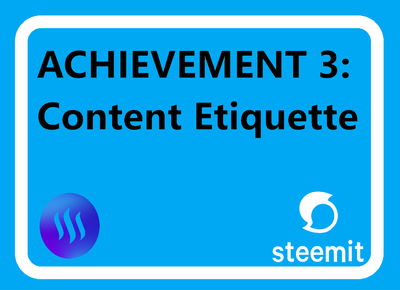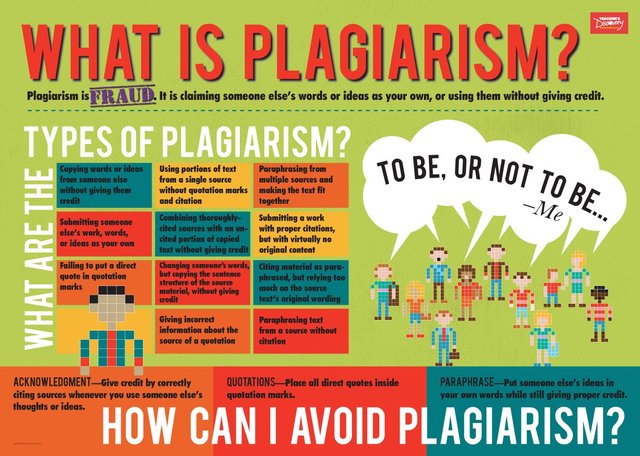It's amazing joining this community. I'm so ad to have completed my achievements 1 and 2, and behold my achievement 3.

Achievement 3 task is on content Etiquette and I'll be explaining what plagiarism is all about.
Before that I'd love to talk little on Etiquette and what Etiquette entails.
What is Etiquette?
Oxford dictionary defines Etiquette as the customary code of polite behavior in society or among members of a particular profession or group.
Etiquette is the set of conventional rules of personal behavior in polite society, usually in the form of an ethical code that delineates the expected and accepted social behaviors that Accord with the conventions and norms observed by a society, a social class, or a social group. In morden English the word étiquette(ticket) dates from the year 1750 SOURCE.
What is Plagiarism?

Plagiarism is the practice of taking credit for someone else's words or ideas. It's an act of intellectual dishonesty. In colleges and universities, it violates honor codes and can cause irreparable damage to a person's reputation. It also comes with serious consequences; a plagiarized assignment may lead to a failing grade, a suspension, or an expulsion.
Clearly, the issue is not to be taken lightly. However, if you act with academic integrity, it's also nothing to fear. The best way to avoid plagiarism is to understand the concept itself.
Types of Plagiarism
Some forms of plagiarism are obvious. Copying someone else's essay word for word and submitting it as your own? Plagiarism, of course. Turning in an essay you bought from a paper mill is too. The issue is not always so blatant, however. In addition to overt acts of academic dishonesty, other, more complex forms of plagiarism exist, and they lead to similar consequences nonetheless.
Direct plagiarism is the act of copying another person's work word for word. Inserting a paragraph from a book or article into your essay without including attribution or quotation marks, for example, is direct plagiarism. Paying someone to write an essay for you and submitting it as your own work is also direct plagiarism. If you commit direct plagiarism, you're likely to be caught thanks to software and tools such as Turnitin.
Paraphrased plagiarism involves making a few (often cosmetic) changes to someone else’s work, then passing it off as your own. Unless a specific idea is common knowledge, you cannot include it in your paper without providing a citation—even if you do not include any direct quotes.
"Mosaic" plagiarism is a combination of direct and paraphrased plagiarism. This type involves tossing various words, phrases, and sentences (some word for word, some paraphrased) into your essay without providing quotation marks or attributions.
Accidental plagiarism occurs when citations are missing, sources are cited incorrectly, or an author shares an idea without a citation that isn't as common of knowledge as they thought. Accidental plagiarism is often the result of a disorganized research process and a last-minute time crunch. Ultimately, if you fail to cite your sources appropriately, you've committed plagiarism—even if you had every intention of giving credit.
How to Avoid Plagiarism
Not everyone who plagiarizes starts out with the goal of stealing someone else's work. Sometimes, plagiarism is simply the result of poor planning and a few bad, panicked decisions. Don't fall victim to the plagiarism trap. Follow these tips to produce successful, original academic writing.
- Begin the research process as early as possible, preferably as soon as you receive a new assignment. Read each source carefully. Take breaks between reading sessions to absorb the information. Explain each source's key ideas out loud, without referencing the original text. Then, write down each source’s main arguments in your own words. This process will ensure you have plenty of time to both absorb your sources' ideas and formulate your own.
Write a thorough outline. After you’ve spent time researching and brainstorming, write a detailed outline of your paper. Focus on pinpointing your own original argument. As you outline, imagine yourself in conversation with your sources. Instead of restating your source's ideas, examine them and consider how they relate to your own.
Paraphrase “blind.” If you plan to explain an author’s ideas in your paper, write the explanation without looking at the original text. If you find this process tricky, try writing out the ideas in a conversational tone, as though you’re explaining the idea to a friend. Then rewrite the information in a more appropriate tone for your paper.
Keep track of your sources. Make a list of every source you read, even the ones you don’t expect to refer to in your paper. As you write, create a running bibliography using a free bibliography generator tool. Anytime you quote or paraphrase an author’s ideas in your draft, include the source information right next to the relevant sentence. If you’re writing a long paper, consider using a free citation organization tool such as Zotero or EndNote.
Use an online plagiarism checker. Although online tools are not foolproof, it’s a good idea to run your paper through a plagiarism checker before submitting it. You may discover that you’ve unintentionally composed a sentence that closely resembles something written by one of your sources or failed to include a citation for one of your direct quotes. Free resources such as Quetext compare your work to millions of documents and search for close matches. Your professor probably uses these tools, and you should too SOURCE.
Wow! Nice work.
You really took your time and I know you understood the rules of the game.
Say no to plagiarism.
congregations on your achievements 3
Downvoting a post can decrease pending rewards and make it less visible. Common reasons:
Submit
Thank you very much I appreciate
Downvoting a post can decrease pending rewards and make it less visible. Common reasons:
Submit
Thanks for shedding more light to this issue of copying other peoples work. Plagiarism is an insult to the affected person.
Downvoting a post can decrease pending rewards and make it less visible. Common reasons:
Submit
You have proven to us truly that you understand this very issue on plagiarism
Keep it up dear @blinks002
Downvoting a post can decrease pending rewards and make it less visible. Common reasons:
Submit